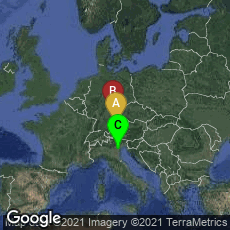

A: Maxvorstadt, München, Bayern, Germany, B: Mitte, Nürnberg, Bayern, Germany, C: Padova, Veneto, Italy
The library of Hartmann Schedel, physician and author of the Nuremberg Chronicle, was unequalled in fifteenth-century Germany. Schedel was interested in virtually all areas of knowledge of the late Middle Ages: rhetoric, astronomy, philosophy, classical and humanist literature, historiography, geography and cosmography, medicine, law, and theology. As early as the 1450s and 1460s, during his studies at the universities of Leipzig and Padua, he transcribed many works in his own hand. Later Schedel took advantage of the growing supply of printed books in Nuremberg, a center of European trade and publishing. He also made use of an international network of correspondents and suppliers to acquire new publications from other places. At the end of his long life, Schedel's library comprised nearly 700 volumes, including many composite volumes with several items.
Even though Schedel stipulated in his last will that his library should remain a family heirloom, Schedel's grandson and heir, Melchior (1516-1571), an imperial soldier, sold his grandfather's books to the Augsburg merchant Johann Jakob Fugger in 1552. In 1571 Fugger sold his library, incorporating Schedel's, to Duke Albert V of Bavaria. It became the cornerstone of the what is now the Bayerische Staatsbibliothek. Today, more than 370 manuscripts and 460 printed items from Schedel's collection are preserved in the Bayerische Staatsbibliothek. This is the largest private collection of books that survived from fifteenth century Germany.
In November 2014, honoring the 500th anniversary of Schedel's death, the Bayerische Staatsbibliothek opened a physical and virtual exhibition of books from Schedel's library. In October 2020 the home page of the virtual exhibition, with links to many downloads of digital editions, including all five editions of the Nuremberg Chronicle, was available at this link.